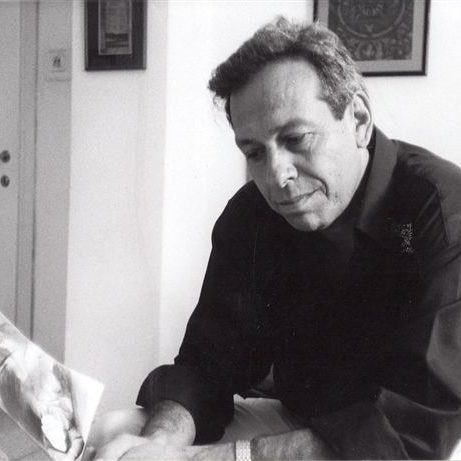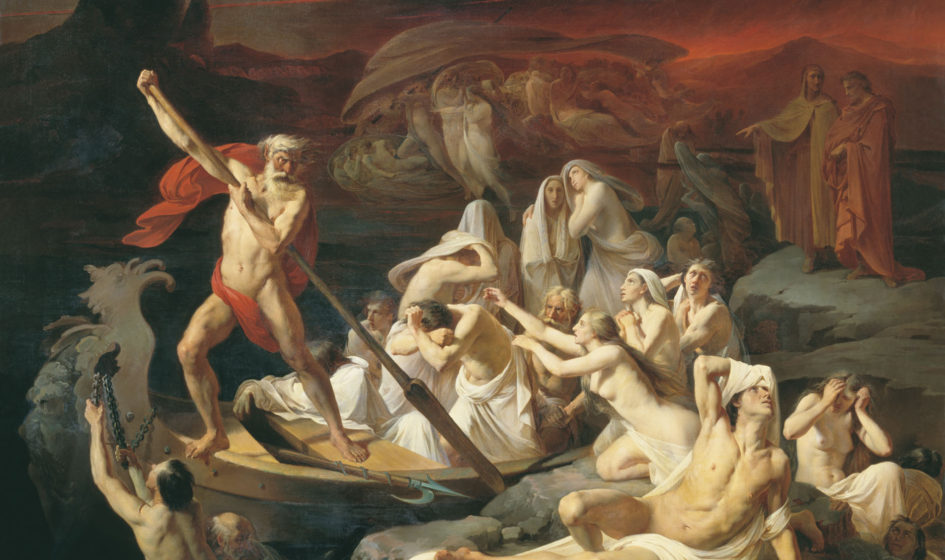Before knowing how to go Home (Odyssean Cp.11), Odysseus visits the land of the dead and summons the spirits of the dead; it is an encounter with the spirit, misery with memory, and the need to process what has happened to you in your life to this day to come to the inner and outer home. It will also make it clear to you what to do next and what will happen later; that is what tells him Circe (the witch and the wise old woman).
Guiding by the Old wise Woman
The intuition grows, the awareness expands, and the complexes are slightly released. But memory and healing by emotional processing are needed. It requires courage, imagination, strength, patience, diagnosis, listening, and understanding of what is beyond. Approaching what Maimonides (Rambam) calls a prophet. There is an encounter with the spirits of his mother, Agamemnon's Achilles, and those he never knew who are like archetypal ghost figures.
Getting close to the miserable of life to the suffering, to Depression
This whole journey was made in tears. The wind is for them, and the day is falling… They arrive in a dark land without Helios' gaze at the sun. The land and city of Kemiris. A land of helpless people is like a kind of likeness of those who are perpetually close to death. Coming to the land of death is very, very significant for the ability to return to inner and outer home. Odysseus will go through the deepest transformation here and get acquainted
with private and general human secrets. It will also touch emotionally on the area of human suffering, diseases, disasters, and sudden death.
Going down to Hades will recognize the smallness of man in the face of human wisdom that has accumulated in the human soul and in the human spirit, which will help get rid of hubris.
But to go through all this emotionally and cognitively, you need a different language, a different approach, and other tools. You must feel the difficult things themselves: the traumas, the encounters with death in wars, the shock and the difficulty that Odysseus has already gone through. But the processing, the emotional, mental entrance to the matter, the emotional awareness, and the depth, must go through even to become more human, to the person capable of returning home
The triggers in reality-Depression
The encounter with the character of Elpenor – with the spirit of the soldier from his Army who has just died, is the first encounter: "the hopes of man, the reference to those you left on the way," and from this encounter with the death of the friend and the "active imagination" that Odysseus does with him he learns a lot! (Line 60 to 75). The story of Elpenor, a corpsman who sat on the roof drunk, unconscious, and went downstairs without a ladder. It is precisely his spirit that turns to Odysseus in the name of the laws of life that Odysseus has forgotten. There is a serious encounter with death here. Then the ghost of his mother, Anticleia (a thieves' key), appears before him,
Anticleia (the daughter of Autolycus – a wolf) is the spirit of his mother, whom Odysseus initially rejects and will meet literally only after they have met the spirit of the wise old prophet, not before.
Meeting with the Prophet Theresia's (wise old man)
(Line 90-135) the Prophet says and emphasizes that Odysseus is now in a miserable state; he came to the land of the dead! "You are looking for the sweet way to your home, but this is not your way because you have blinded the Son of the Gods", which means that the Prophet tells him, you too were blind, is something very basic. You must learn heart restraint, especially when you face the fruit and sheep of Helios. Your greed, carelessness, and hubris, and touching what is forbidden are what will bring you a continuation of trouble. Supposedly the recognition of Odysseus in his shadow is important … "You have to get to a place where you don't know the sea: the wanderings, the drift, the eternal sailing, but you know and feel the great distance from home!
Only where you do not know what a paddle is and think and are sure that it is a sewing device will you know that you are at home, stably? The prophet also tells Odysseus about his future death that will come far from the sea in a state of a good return. The whole truth was told by the Spirit of the Prophet only after drinking the blood – the true mental energy! It is necessary to revitalize the psyche with energy so that we feel and know the truth ,and the vitality of the soul is done with the help of energy – symbolized as the blood of the other.
See The Shadow and Dawn from Hybris
And the question remains for Odysseus: what it mean to be punished by the god Poseidon, to be occupied by the energy of Poseidon as it was Odysseus. To be dominated by the sea energy, the emotional storms, the instincts, The strong emotions and will, the power and the ego.
In order to get home, all this needs to be moderated and consciously controlled.
The encounter with the mother's spirit (line 155-220)-Feeling
The mother's spirit is very surprised that her living son nods; Odysseus comes to such a place as Hades. "How does my son become so miserable that you come to ask", she asks, "he shares with his mother that even before he got home, there were many hurts and traumas he had on his way since I separated from Agamemnon after the war. Then he himself begins to be interested in the other, in others, and in the mother per se.
"How did you die?" He asks his mother, he meets with her love, with concern, with the suffering he wants to hug her, but in Hades, where there are only spirits, there are no real hugs. (Line 210).
Odysseus learns about emotional feelings, and the spirit takes the emotional function out of the mother's spirit as Hillman. J says (you have to save the feeling function from the mother complex). He is interested in his father, his wife Penelope, and his son Telemachus. Then later, he learns about women and their suffering in his world and the Greek world
Encounter with the females suffering (in a Patriarchal Culture)
An encounter with the spirits of women who all suffer either because of their association with an abusive god figure or because of their husbands is important before encountering the Anima.
First appears the spirit of Tyro, who fell in love with the river Anaphias and the river, but Poseidon also appeared as a river, and she bore him two children whom she abandoned out of fear of her father and out of great distress: Palais& Nereus. It is a tragic story about abandonment and revenge. They themselves grew up and took revenge on their mother's mother, and a whole story was created
. A second appears, the ghost of Antiope- (with a face opposite) a story of abuse, the birth of two sons that also end in expulsion and abandonment, and the boys later take revenge on the abusers after they have grown up! Found them in the forest after miraculously managing to escape after years.
A third appears the ghost of Alcmena (the power of the moon), the mother of Hercules who was haunted by Hera and probably also by her husband. And a girl as is known twins Hercules Ephikles.
A fourth of the spirit of Megara (Oracle cave), daughter of Kyron that Hercules received her and, in his madness, killed her children and probably her too.
A fifth of the spirit of Jocasta (luminous moon) if Oedipus unknowingly lived with him and then committed suicide
A sixth of the spirit of Cloris (the green) that Neleus carried her after her father made contests and gave gifts. A beautiful daughter girl around whom there were many contests and gifts for the winners- Herds.
A seventh of the spirit of Leda (Mrs.) is the wife of Thunderous, who was fertilized by Zeus. She is the mother of the Helen & Clytemnestra sisters, one half of these and the other a human being. The twin's Castor Polyducts& one of whom is immortal.
The eighth Amphidal spirit (the one that strengthens the genitals) fell in love with Poseidon, sat by the sea, and filled her legs with seawater until she became pregnant with Poseidon. She gave birth to two giants who just made trouble, and the gods, mainly Ares, Hermes & Apollo, fought them. A huge example of rampant hubris
The ninth of Phaedra's spirit, the tenth of Ariadne, and finally, the spirits of Mirna and others are raped.
And here, there is a rest in the story narrated by Odysseus in the palace of Queen Aretha and King Elkionos and their daughter Princess Nausicaa.
Queen Aretha addresses everyone and asks what you say about the man after hearing the stories of Odysseus up to this point
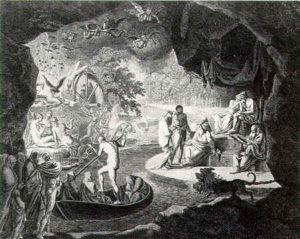
The listeners are impressed by Odysseus' ability to go deep into his inner soul.
The Payak, after hearing the stories, begins to appreciate Odysseus and gives him many gifts. Especially after the stories of the descent to Hades, which are interesting, they begin to appreciate him and believe him, they realize that he has gone through deep, difficult things that penetrate their hearts. As a kind of wisdom of the heart. King Elkionos wants to continue the stories. he wants to hear about men. Odysseus is tired but continues to tell. It tells about disasters and the intrigues of an evil woman Clytemnestra the negative equivalent of his wife Penelope, waiting at home.
And after Persephone finished down there to present before Odysseus the women and pity for unhappy women, the female suffering, and the male exploitation of the women mothers and sons! Comes the grieving spirit of the warrior Agamemnon and the men.
Suspicions toward the women
He studies Agamemnon, and Agamemnon describes what his wife has done to him (lines 405-430). Here comes the rage of the fighters on their women and the lack of faith in women. And especially about the lack of faith that will later affect Odysseus when he comes home to his wife.
Do not tell your wife everything he hints to him, even though Agamemnon knows that Penelope is a different kind of woman. Agamemnon suggests that he arrive secretly, hide his ship, do it and pass tests. Agamemnon really wants to know what the fate of his son Orestes was.
It seems that the spirits in Hades also have curiosity. The meeting is very moving for Odysseus.
Then the spirit of Achilles appears: he asks Odysseus, what other greatness do you want to do? How did you dare to come down here? Odysseus is aware of the paradox of Achilles, who was a half-god and sits among the dead. "Do not reconcile me with death," he says to Odysseus. He wants to hear from Odysseus about his son, who was married to Menelaus's house then. He wants to hear about his father, Peleus the Elder (line 500), the son of Achilles Odysseus, who gives credit and learns very much to praise others. What he did not know so far (line 520-535).
Some things cannot be forgiven
All the spirits meet, ask and want him to know, except for the ghost of Ajax, son of Talmon, who committed suicide because of Odysseus! His own spirit stood aloof, still outraged by the fact that, despite winning in Troy, he did not receive an award due to Odysseus.
And Odysseus here regrets cheating and lying to Ajax, trying to appease him. "Won't you forget anger even in death as a spirit? No one is to blame… Odysseus literally begs him (line 560-565) but the spirit of Ajax does not forgive, and it turns towards the darkness. Although the expression of anger can speak and solve, Odysseus understands that there are things for which there is no forgiveness.
Later, he turns to other heroes and learns something about the archetypal world of wars and death.
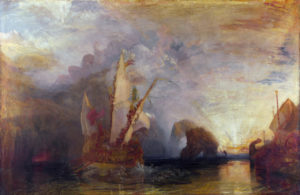
Knowing about Eternal Punishments
He meets the ghost of Minos, the judge of the underworld and Orion, the illustrious rider.
Then he meets the imprisoned spirits of the great sufferers of the underworld, the great punished heroes.:
Thiteus, who raped Leto and was punished
Tantalus deceived the gods and sacrificed his son and remained with the punishment of bitter anguish.
Sisyphus, with the stone, deceived the gods and used his talents to outwit them.
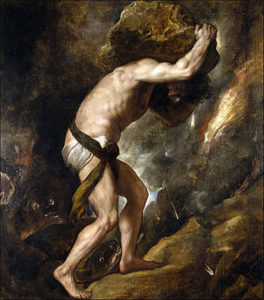
Meeting Your Admired Hero
Hercules, whose spirit is particularly impressive. Hercules turns to Odysseus and talks in tears about their complicity with fate. (Line 615-625) Hercules recounts with sorrow how he was punished and had to be forgiven for his honor even though he was the son of Zeus and, therefore, half a god, despite being so strong. The renunciation of the inflation of each hero is very central here.
He tells him and emphasizes that he, too, Hercules went down to Hades and wanted to learn from the characters of the heroes he would meet there like himself.
The entire journey down of Odysseus is accompanied by fear and death anxiety from monstrous spirits like Gorgons.
All this move prepares and strengthens him also to withstand the sirens later
The danger of Inflation from the Effect of getting out.
Song 12 Circe instructs Odysseus and his men on how to continue
They continue to linger on the island of Circe, the island of the Aya, lamenting and are given guidance on the way, but first, Odysseus carries out the results of his lesson to take care of those who have died and those he left behind. Elpenor that his body should be taken and held a heroic ceremony for it as it deserves.
Circe congratulates them and says, "each one died once, and you died twice or lived twice," supposedly also the death, while to Hercules at the time, it was said something different "you overcame death". (Not lived death)
Now, after the upbringing of Hades, there is also an emphasis on life, relish, food, etc.
The Fascination of Death, ward the End, danger of giving up
Circe explains to Odysseus about the singing of the Sirens and the criticality of the seduction of these women of death, who are half birds and are like the Sirens that have a huge deadly and attractive effect to regression and to death. Be careful, seal ears, or be tied to the mast.
She also warns them of the monsters beating along the way. Skyla
&Carbide even though he has that will appear as large cliffs lurking in the sea salts. All this Odysseus's choice is, after all, possessing heroic tendencies to suicide. It helps him identify these traps. Cliffs care lied alluvial rocks and no chicken passes there.
The Argo did pass with Hera's help and because of her love for the golden fleece hero Jason, but she specifically warns him: "There are huge rocks there, alluvial rocks
…
The second trap with two cliffs, one rises to the sky at a sharp peak topped by a dark cloud that does not move, and in the middle of the cliff, a hazy cave faces the direction of myrtle, and this cave you will reach for sure. (Line 25-100)
And the second cliff is lower where a large fig tree tangled in leaves and under the black sea water the witch Charybdis swallows, she swallows vomit. Skyla will still only kidnap some of the people.
Care about your people
Odysseus also wants to protect his men and is looking for such an option, and here Circe prepares him to descend from inflation and a huge need to fight even the eternal archetypal immortal evil. Call the mother of Carbides (vacuuming down). She will help. It is basically an incarnation of all kinds of dog-like monsters starting with Egyptian mythology – Anubis. These monsters were called the sea traps, the horror of sailors. A cushion guides them on how to maneuver and get out. There is both the art of sailing and how not to be a great hero but to sacrifice and to give.
The Ego still wants something
Then comes the issue of the herd of Helios, a herd from which it is forbidden to steal you will not steal, an affair like the affair of the golden calf and Moses the leader. that predicts the troubles of the people.
The guardians of the herds of Helios are nymphs of the daughters of Helios! Circe's sisters
Odysseus performs what she has advised him to do and shares with his people the wisdom of her woman. He learns much more to share and be considerate. And he passes and hears (line 185)
Some people are tempted. Odysseus already has a relative perspective on the troubles.
Odysseus does not accept Circe's advice not to fight the Scylla that is supposed to take six of his men, but he fails in doing so, and they leave the scene with a tooth and an eye
What belongs to God and not to you?
Then you reach the island of the Helios rams, where it is forbidden to steal flocks despite the temptation.
It is especially important to have restraint and patience when there is a greater goal.
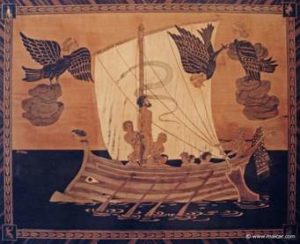
.
.
.
